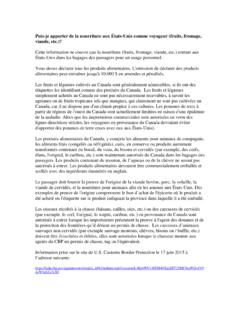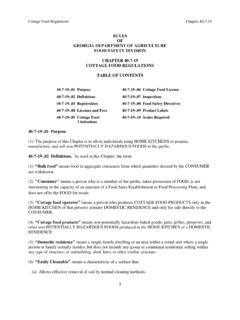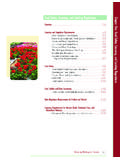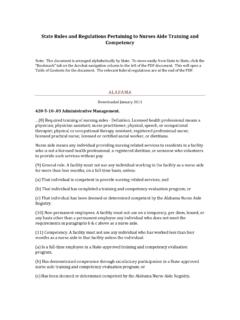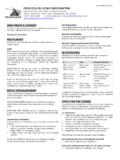Transcription of Travelers bringing food into the U.S. for personal …
1 Travelers bringing food into the for personal use; US Customs and Border Protection, Updated 06/24/2013 Can I bring in food as a traveler (fruit, cheese, meat, etc.)? The information contained in this answer does not apply to food being sent to the through the mail, courier services or other means. This information only covers food (fruit, cheese, meat, etc.) entering the United States in passenger baggage for personal use. You may be able to bring in food such as fruits, meats or other agricultural products depending on the region or country from which you are traveling.
2 Restrictions are placed on these products to protect community health, preserve the environment and prevent the introduction of devastating diseases to domestic plants and animals. Failure to declare food products can result in up to $10,000 in fines and penalties. The following are generally admissible: -Condiments such as ketchup (catsup), mustard, mayonnaise and prepared sauces that do not contain meat products -Olive oil and other vegetable oils -Bread, cookies, crackers, cakes, granola bars, cereal and other baked and processed products -Candy and chocolate -Cheese- Solid cheese (hard or semi-soft, that does not contain meat); butter, butter oil, and cultured milk products such as yogurt and sour cream are not restricted.
3 Feta cheese, Brie, Camembert, cheese in brine, Mozzarella and Buffalo Mozzarella are permissible (USDA Animal Product Manual, Table 3-14-6). Cheese in liquid (such as cottage cheese or ricotta cheese) and cheese that pours like heavy cream are not admissible from countries affected by foot-and-mouth disease (FMD). Cheese containing meat is not admissible depending on the country of origin. -Canned goods and goods in vacuum packed jars (other than those containing meat or poultry products) for your personal use -Fish- personal amounts of fish, shrimp, abalone and other seafood are allowed and can be fresh, frozen, dried, smoked, canned or cooked -Dried Fruit- things like apricots, barberry, currants, dates, figs, gooseberries, peaches, prunes, raisins, tomatillos, and zereshk (USDA Miscellaneous and Processed Products Manual, Table 3-69)
4 -Liquid milk and milk products intended for use by infants or very young children are admissible if in a reasonable amount or small quantity for several days' use. Note: Milk and milk products from goats must be accompanied by a USDA import permit if from regions classified as affected with foot-and-mouth disease (FMD) or Rinderpest. -Powder drinks sealed in original containers with ingredients listed in English. However, admissibility is still under the discretion of the Customs and Border Protection (CBP) Agricultural Specialist. -Juices- commercially canned (USDA Miscellaneous and Processed Products Manual, Table 3-75) -Tea- commercially packaged and ready to be boiled, steeped or microwaved in liquid.
5 Coca, barberry and loose citrus leaves are prohibited (USDA Miscellaneous and Processed Products Manual, Table 3-148) -Coffee- roasted or unroasted if there is no pulp attached. (USDA Miscellaneous and Processed Products Manual, Table 3-48) -Spices- most dried spices are allowed except for orange, lemon, lime and other citrus leaves and seeds, lemongrass, and many vegetable and fruit seeds -Honey- comb honey, royal jelly, bee bread, or propolis if it is not intended to be fed to bees (USDA Miscellaneous and Processed Products Manual, Table 3-100) -Noodles and ramen that do not have meat or eggs in the spice packets -Rice- (See ALERT below)
6 White rice, basmati rice, brown rice, husked rice, polished rice, rice flour and other products that do not have the hull attached (USDA Miscellaneous and Processed Products Manual, Table 3-130). ALERT: Effective July 30, 2011 non-commercial quantities of rice from countries where Khapra beetle is known to occur will be prohibited from entering the United States. Failure to declare rice will result in fines. -Flour- wheat, rice, oat and cornmeal -Mushrooms, fresh and dried- above ground parts that are clean and free of soil -Nuts- All nuts are allowed if they have been boiled, cooked, ground, oven dried, pureed, roasted, or steamed.
7 Other nuts may be allowed if they are free from their husks (the shell remains), such as almonds, betel nuts, Brazil nuts, cashews, coquilla nuts, filberts (hazelnuts), Java olives, kara nuts, gingko nuts, macadamias, pecans, pili nuts, pine nuts (pinon nuts), pistachios, and walnuts. (USDA Miscellaneous and Processed Products Manual, Table 3-105, 3-106) -Bakery items, candy, chocolate, and dry mixes containing dairy and egg ingredients [such as baking mixes, cocoa mixes, drink mixes, instant cake mixes, instant pudding mixes, liquid drink mixes containing reconstituted dry milk or dry milk products (including those that contain sugar), potato flakes, and infant formula] commercially labeled and presented in final finished packaging are generally admissible.
8 (..) Canadian Agricultural Products: For fruits and vegetables from Canada, consult the FAVIR database. Fruits and vegetables grown in Canada are generally admissible, if they have labels identifying them as products of Canada. Fruits and vegetables merely purchased in Canada are not necessarily admissible, citrus or tropical fruits such as mangos, which clearly were not grown in Canada because it does not have a climate that supports those crops. (Potatoes from western regions of Canada are currently restricted because of a disease outbreak.)
9 While commercial imports are permitted under stringent guidelines, Travelers from Canada should avoid bringing raw potatoes with them into the ). food products from Canada, including pet food and fresh (frozen or chilled), cooked, canned or otherwise processed products containing beef, veal, bison, and cervid ( deer, elk, moose, caribou etc.) are now permitted from Canada in passenger baggage. Products containing sheep, lamb, or goat will not be allowed entry. The passenger must provide proof of the origin of beef, pork, poultry, cervid meat, and pet food in order to bring them into the United States.
10 Examples of proof of origin include the grocery store receipt where the product was purchased or the label on the product indicating the province in which it was packaged. Hunter harvested game birds (pheasant, quail, goose, etc.) or cervid carcasses ( deer, moose, elk, caribou, etc.) from Canada are allowed entry when importers present to the Customs and Border Protection officer evidence such as a hunting license that the product is hunter harvested wild game. Hunter-harvested wild non-cervid animal ( wild sheep, goats, or bison/buffalo, etc.)
